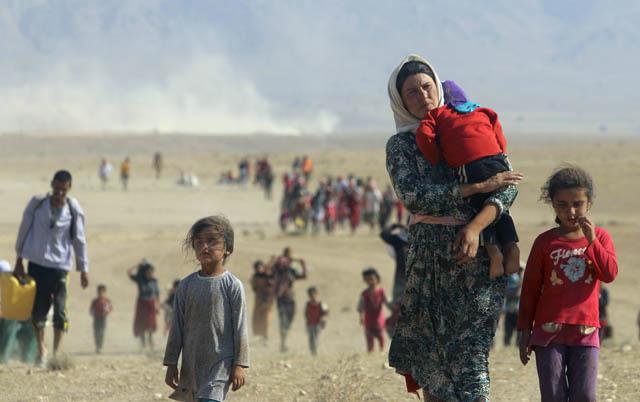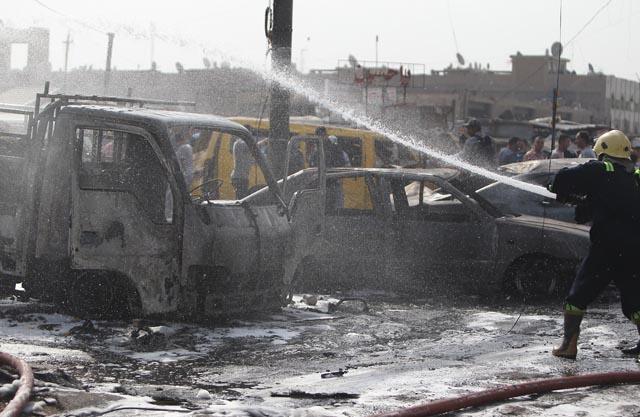You are here
Militias must follow state — Abadi
By AP - Aug 25,2014 - Last updated at Aug 25,2014
BAGHDAD — Iraq’s prime minister-designate called on the country’s numerous Shiite militias and tribes to come under government control and stop acting independently on Monday, as violence across the country killed at least 43 people in areas where the Muslim sect dominates.
The comments by Haider Al Abadi came at his first press conference since accepting the nomination to be Iraq’s next prime minister, underlining how he is attempting to address the worries of the country’s Sunnis, who say that Shiite militias are targeting them in religiously-mixed areas. He added that discussions between political rivals to form a new government were “constructive and positive”.
“We will never allow any armed group to operate outside of the framework of the state,” Abadi told reporters at the presidential palace in Baghdad’s fortified Green Zone. “They all should be within the state framework and under the control of the security forces,” said Abadi.
A number of Shiite militias have answered a call by influential Iraq-based Shiite cleric Grand Ayatollah Ali Al Sistani, and outgoing Prime Minister Nouri Al Maliki, to support the Iraqi military, after large divisions fled from Islamic State militants in the northern cities of Mosul and Tikrit.
A number of Sunni tribes also oppose the militant group.
Abadi also expressed optimism that he will meet the September 10 deadline to form a new government.
“Several meetings and dialogues were held with the political blocs to form a unified vision for our governmental programme, he said. “The negotiations were generally positive and constructive. I hope we will agree to form a unified vision for the governmental programme in the next two days.”
Also Monday, separate attacks in several cities, including Baghdad, killed at least 43 people and wounded dozens in Shiite-majority areas.
The deadliest was carried out by a suicide bomber who blew up an explosives-laden vest among Shiite worshippers leaving a mosque after noon prayers in the capital’s eastern New Baghdad area, killing at least 15 and wounding 32 others, a police officer said.
In Karbala, an explosion killed 12 civilians and wounded 31 others. In Hillah, two car bombs went off in separate areas, killing 11 people and wounding 26 others.
In Baghdad’s southern Dora district, a roadside bomb missed a police patrol but hit a civilian car, killing three and wounding 11 others, he added. Two other civilians were killed and 10 wounded in another bomb explosion in an outdoor market in the northern Shaab neighbourhood, another police officer said.
Medical officials confirmed the causality figures, speaking on condition of anonymity as they were not authorised to release information.
Since early this year, Iraq has been facing a growing Sunni insurgency with the Islamic State group and allied Sunni militants who have taken over areas in the country’s west and north. The crisis has worsened since June when the group declared an Islamic state, or caliphate, in territory under its control.
The United Nations on Monday condemned what it called “grave, horrific human rights violations” committed daily by the Islamic State and associated armed groups in a “widespread ethnic and religious cleansing in areas under their control”.
Related Articles
A gathering of millions of Shiite Muslims at shrines and mosques across Iraq for the Ashoura religious commemoration passed without any major attacks on Tuesday, under tight security imposed for fear of Islamic State (IS) bombers.
Iraq's new prime minister-designate won swift endorsements from uneasy mutual allies the United States and Iran on Tuesday as he called on political leaders to end crippling feuds that have let jihadists seize a third of the country.
Iran has supplied weapons and ammunition to Iraqi Kurdish forces, Kurdistan President Massoud Barzani said Tuesday at a joint press conference with Iranian Foreign Minister Mohammad Javad Zarif in Erbil, capital of Iraq's Kurdish region.














